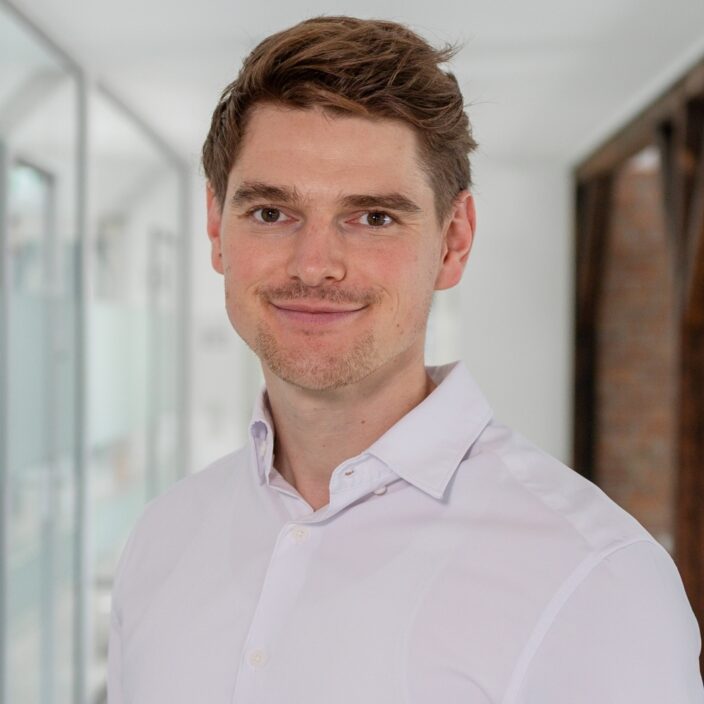

August 18, 2023
"It is crucial to recognize that we have the opportunity and that we might succeed."
Dr. Dirk Textor discusses the current status of plastics recycling in an interview with plasthip
- Recycling
- Kreislaufwirtschaft

August 18, 2023
Dr. Dirk Textor discusses the current status of plastics recycling in an interview with plasthip

My name is Dirk Textor, and as you mentioned, I serve voluntarily as the chairman of bvse, the professional association for plastics recycling. Additionally, I lead Dr. Textor Kunststoff GmbH and run Dr. Textor Consulting, where I offer advisory services in the plastics sector. I am also employed by Otto Graf GmbH, a company that utilizes post-consumer recyclates in various applications for rainwater harvesting, storage, and infiltration.
My career in the plastics recycling industry, particularly in packaging plastics, began 25 years ago. I started at the Waste Disposal Company Ruhrgebiet and then moved to the then-subsidiary of the Green Dot, DKR. At that time, there was only one dual system managing plastics recycling. Through this role, I became acquainted with many plastics recycling plants across Germany and eventually transitioned to a plastics recycler in Gescher, Westphalia, where we recycled mixed plastics, films, and polypropylene. Subsequently, I joined Otto Graf. Thus, I have gained extensive knowledge of almost the entire value chain of plastics, particularly plastic packaging that becomes waste. My career has provided me with substantial experience, especially in the last 3-4 links of this chain. In recent years, I have also focused on understanding the earlier parts of the chain, such as packaging manufacturers and distributors, to better grasp the reintroduction of recyclates into the market. This comprehensive perspective has enabled me to gain a thorough understanding of the industry, though not down to the smallest detail.
My involvement with bvse began during my time in Gescher, where I proposed our membership to stay updated on political developments and make an impact. Membership led to my election to the board of the association, where I served as vice-chairman for a while and have been the chairman for nine years now.
This role has allowed me to gain invaluable experience and expand my expertise. I have met many wonderful people, far more than I would have had I stayed in Gescher. Personally, I have greatly benefited from this voluntary position and am very satisfied with my career progression.
Currently, there is a significant discrepancy in plastics recycling between the amounts actually recycled and the associated issues and problems. The "Material Flow Analysis for Plastics in Germany 2021" study by Conversio provides informative data on the current use of plastics, the amount ending up as waste, and how much is actually recycled. The term "recycling" implies a circular process, but alarmingly, only about 9% of the used plastics are recycled as recyclate. This 9% is roughly divided into high-quality recycling (also known as "virgin replacement" recycling) and lower-quality recycling, with the classic park bench often cited as an example. The figures clearly show how little is actually returned to the cycle. This issue is globally significant, and much is discussed about it. However, progress seems too slow and inadequate to keep pace with the increasing use of plastics. Furthermore, it's crucial to recognize – often overlooked in the circular economy debate – that recycling alone is not a comprehensive solution. The amount recycled is minimal compared to the enormous growth in virgin material capacities. It’s a major problem that cannot be solved by recycling alone. The debate often gives the impression that increased recycling can solve the entire problem, which is certainly not the case. Priority should be given to fundamentally reducing waste and avoiding short-lived plastic products. When plastics do become waste, material recycling is undoubtedly the best solution from an ecological and climatic standpoint.
A further challenge is the issue of economic viability. This applies to both the front end of the value chain in design for recycling and, particularly, to plastics recycling itself: "It must be profitable." There must be a way to make serious money from it. Unfortunately, this is not currently the case for plastics recycling. The prices for virgin materials are decreasing in the long run, and this is concerning because, while plastics are becoming cheaper, the costs for recycling are logically rising due to energy and labor expenses – and that simply doesn't match up.
Therefore, there needs to be a stronger implementation of CO2 credits, either as bonuses for recyclers or as a surcharge on the price of virgin materials, to make the price gap between virgin materials and recyclates large enough to make it increasingly worthwhile for plastic processors to use recyclates. It's often overlooked that the origin of recycling lies in its cost-effectiveness compared to manufacturing and using virgin materials. This applies to paper and metal and should also apply to plastics since processors naturally prefer the cheaper virgin material if there are no incentives.
Currently, I see a major sticking point in this issue, and if it is not quickly addressed, the outlook for plastics recycling is bleak.
Quotas are undoubtedly a tool to legally advance recycling, but this doesn't necessarily mean that recyclers benefit financially. While this results in larger circulating quantities, these are almost trivial. The "most valuable" quantities were already being recycled before quotas were introduced. Essentially, quotas have led to more difficult-to-recycle plastics being recycled. In terms of marketability at the end of the chain, the recycler doesn't have the best options when they suddenly have to market material that was burned yesterday and recycled today. Therefore, the issue remains challenging. If there is no incentive at the end of the chain to use recyclates, the existing measures have had little impact.
My contact with plastship was, at least from my side, a happy coincidence. Whether it was a planned coincidence on your part, I can't say. You approached me during a coffee break at a VDI seminar in Hanover where I was giving a presentation, and we started talking. Since then, I have been regularly exchanging ideas with Andreas Bastian, and we aim to connect companies with plastic waste or those considering circular systems with potential recyclers and re-users of these recyclates. Additionally, we work together on assessing the recyclability of packaging. plastship also asked me to participate in auditing and to cross-check and sign off on certifications based on my evaluation.
My extensive experience in the recycling industry for packaging has earned me a certain credibility and expertise. I am well-positioned to assess whether a specific packaging is recyclable and whether this aligns with the facts. I am proud to undertake this task with plastship. You work closely with Plastic Recyclers Europe, who are naturally keen to ensure that audits for these packages are not conducted by "just anyone."
I particularly enjoy working with plastship because of my interactions with Andreas Bastian. We maintain an open, pleasant, and fair relationship and get along well. It's not just about business; we keep each other updated, support each other, and stay in contact. We resolve issues together, provide referrals, and support one another. This mutual support works excellently between us, and I am very happy with our collaboration.
Collaborations between individuals like myself and digital platforms like plastship, especially those functioning as networks, are crucial. Young people use digital media differently than my generation. In our industry, people my age often possess significant expertise. I'm concerned that this knowledge will be lost when these experts retire. Much of our networking and knowledge transfer still occurs analogically, for instance, at events like the recent used plastics conference in Dresden hosted by bvse. After retirement, this form of exchange will naturally disappear, and many experienced individuals with 30 to 40 years of experience may no longer contribute their expertise. If digital platforms can offer a way to digitize and sustainably retain this knowledge in the industry, such collaborations are indeed "crucial for survival."
I once read a book by Hans Rosling, a writer and physician who also contributed significantly to the UN and UNESCO. He said, "I am not an optimist, I am not a pessimist, I am a possibilist." He believes it is always possible. I find this applicable to the plastics recycling industry. I often use an anecdote related to our former Chancellor Willy Brandt, who once said during the gray Ruhr area days, "The sky over the Ruhr must become blue again." He was laughed at back then, but if you look today, the region has significantly improved. The Rhine has fish again, and there have been many positive changes. Therefore, I believe that change is always possible – maybe not always quickly and comprehensively, but fundamentally achievable. Hence, we should not be overwhelmed by negativity in the industry, as that makes nothing possible. But we shouldn't be overly optimistic and end up doing nothing either. It’s crucial to recognize that we have the possibility and that success is attainable – this is of utmost importance.
If you have questions or suggestions, please contact me!

